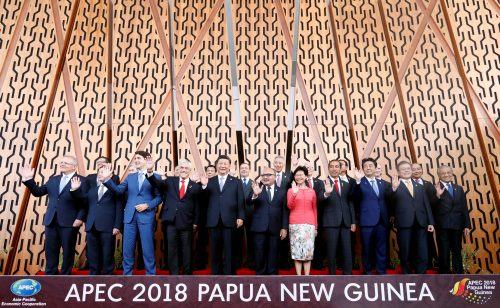The past, present and future of APEC at 30

The Asia-Pacific Economic Cooperation (APEC) forum is approaching its 30th year. But its origins stretch back to even earlier efforts to foster cooperation in trade, investment and development in the Asia Pacific region. Professor Ippei Yamazawa, who passed away recently in Tokyo, was among those who began to lay its foundations 50 years ago.
The Pacific Trade and Development (PAFTAD) forum, an annual academic conference to share ideas about the opportunities for and challenges to sustaining unprecedented improvements in living standards in the Asia Pacific, was born in 1968.
Intellectuals and statesmen including Saburo Okita, Peter Drysdale and Hugh Patrick offered insights on the resources and limitations of different Asia Pacific societies. Rigorous research underpinned the discussions, supported by scholars including Yamazawa, Hadi Soesastro and Ross Garnaut.
Growing understanding between PAFTAD participants from across the Asia Pacific led to mutual trust and respect for alternative approaches to political and economic governance, and to consensus about shared interests.
By 1980, PAFTAD’s work had identified the enormous economic opportunities available as East Asian economies opened themselves to new ideas and investment and trade with the rest of the world.
It had also highlighted the yet untapped ways that cooperation among Asia Pacific governments could accelerate development. Those included reductions in policy obstacles to international commerce and policy coordination in sectors such as energy, transport and education.
It was time to create the Pacific Economic Cooperation Council (PECC), which brought business people and government officials into the conversation (the latter in personal capacities). Yamazawa was a founding member of Japan’s national PECC committee and an early leader of PECC’s Trade Policy Forum.
Learning from ASEAN, it became clear that prospects for substantive economic cooperation among a diverse group of countries needed to be open to trade and investment with all economies, to nurture mutual respect leading to mutual trust, and to be attentive to opportunities to generate mutual benefit.
Cooperation also needed to evolve carefully — encouraging, not forcing, governments to learn from each other and adopt policies and strategies that accelerate improvements in living standards.
Policies that encourage reductions in obstacles to trade and other international commerce were seen to be important opportunities for cooperation within an international rules-based economic environment.
In 1989, Yamazawa helped to prepare the first, successful APEC meeting in Canberra. From 1993 to 1995, he participated in APEC’s Eminent Persons Group, appointed to set directions for Asia Pacific cooperation in its early decades. The groups’ reports are best remembered for encouraging APEC leaders to endorse the ideal of free and open trade and investment.
The reports also reflected the value that Asian participants placed on sharing information, experience, expertise and technology and highlighted the potential for some economies to set positive examples for others. This led to APEC’s economic and technical cooperation program and its pathfinder principle.
Working with Soesastro and Garnaut, Yamazawa helped to shape the concept of concerted unilateral liberalisation: a process in which Asia Pacific governments encourage each other to sustain progress in cutting barriers to trade and implementing cooperative arrangements to facilitate trade, investment and the movement of finance, people and information.
As part of that process, Yamazawa designed a rigorous methodology to monitor the progress of coordinated unilateral liberalisation and contributed to the design of APEC’s Investment Principles.
The average tariffs applied by Asia Pacific governments has fallen from close to 20 per cent in 1989 to less than 5 per cent by 2018. Meanwhile, work on practical initiatives including better and more harmonised customs procedures and the APEC Business Travel Card are already saving billions of dollars every year.
In recent years, there has been backlash against globalisation, accompanied by threats of damaging protectionism and trade wars. Yamazawa would agree with Drysdale that this is no time for APEC to be ‘asleep at the wheel’.
He would also urge cooperation to restore respect for the World Trade Organization (WTO). It remains possible and urgent to design rules for issues not yet covered by the WTO that are based on sound principles and likely to be acceptable to a critical mass of its membership.
APEC economies will never reach the ideal of free and open trade and investment. But they are sufficiently close that they can afford to adopt the even more ambitious ideal of a seamless, regional Asia Pacific economy, cooperating to meet realistic and measurable medium-term targets along the way.
This article was published by The East Asia Forum.
Dr Elek is a Research Associate of the Crawford School of Public Policy at the Australian National University and a member of the Australian Pacific Economic Cooperation Committee. He has worked extensively in development economics in Asia and the South Pacific, including as a Senior Economist with the World Bank.













